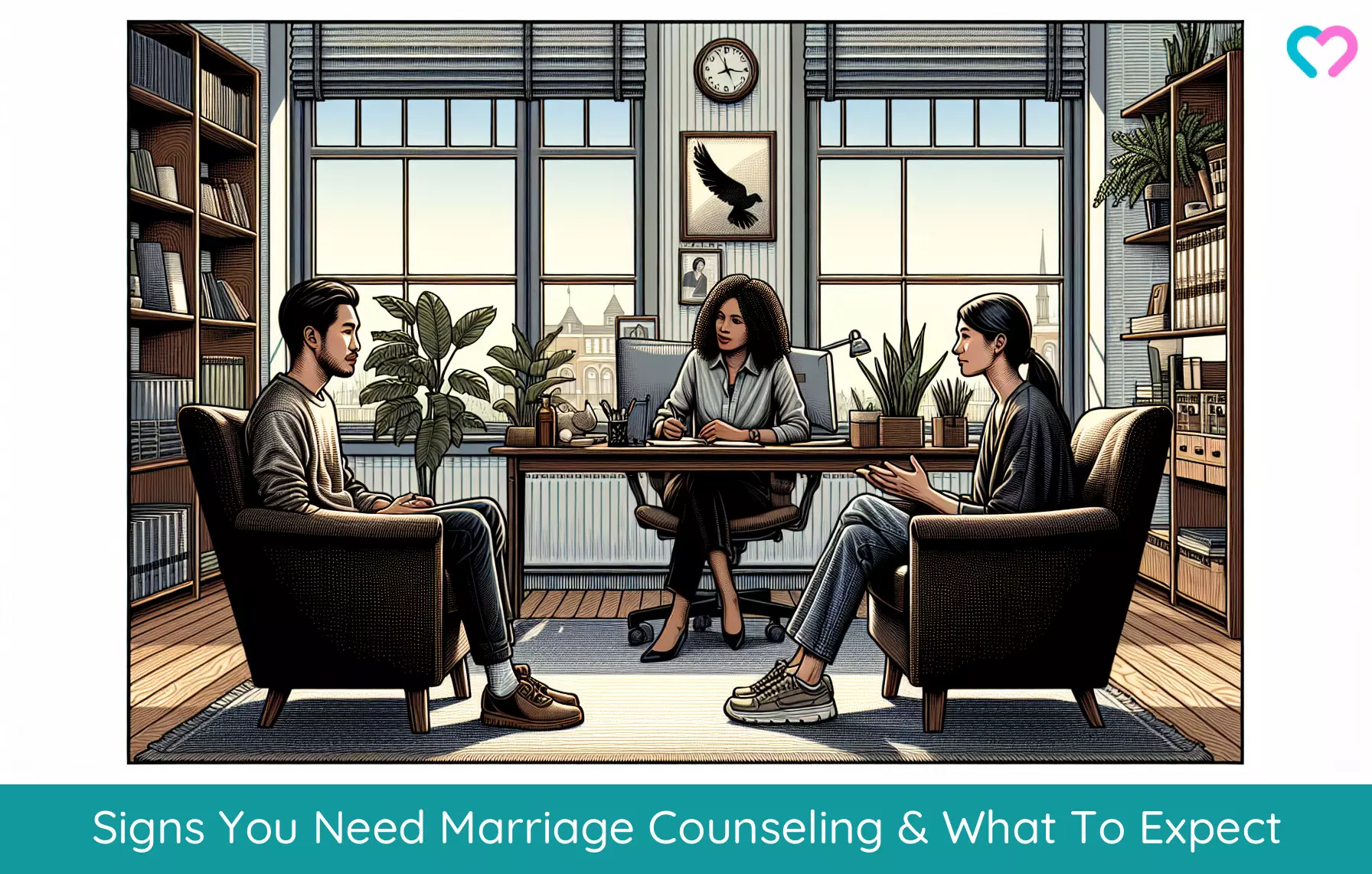

Image: Shutterstock
If you are going through a rough patch in your marriage, you might need marriage counseling to communicate with your partner better. Often, your relationship with your spouse might face some trouble or lose the spark due to various reasons. You might feel like you have lost connection with them. If you and your partner are having frequent arguments and fail to express your views to each other, marriage counseling might be a good option for you. Marriage counseling sessions help you open up to your partner to understand each other better. It offers the gentle push you need to bring the necessary changes for a happy, fulfilling marriage. So, read on to learn more.

What Is Marriage Counseling?
Marriage counseling is a psychotherapy that helps couples in a marriage to identify the problems in their relationship, offer conflict resolution, and improve their relationship. When this is not possible, it may also offer a place to help the couple separate constructively. It is also well-known as couples’ or relationship therapy. By opting for marriage and family counseling, you can make appropriate and thoughtful decisions about mending your relationship or parting your ways. You can also opt for counseling to strengthen your relationship, in general.
Often, marriage counseling is a short term therapy involving both the partners. At times, just one partner works with the therapist to improve the relationship.
Marriage counseling can help couples at various stages of their relationship, such as premarital, post-marriage, family planning, and when kids are growing. Premarital counseling can help couples achieve a deeper understanding of each other and iron out the differences if any.
Couples whose relationship is smooth need not necessarily have to undergo counseling, but it is a good idea for those who are facing a rough phase. Therefore, probe into your life and check for those signs that signal for some help from a professional.
 Did you know?
Did you know?10 Prominent Signs That Tell You Need Marriage Counseling
Here are some warning signs you might not want to miss:
1. You hardly speak to each other:
The absence of communication is one of the major setbacks that your marriage has. You are reluctant to talk and share your ideas, thoughts, and experiences with your spouse. This is an important sign that you need marriage counseling. The marriage counselor can help you find and follow new, effective ways to improve your interaction with your partner.
2. You argue on trivial matters constantly:
If arguments, with a negative tone, become a daily affair, then that is sure to spoil your relationship. When you and your spouse have an argument, one of you is bound to feel disregarded, misunderstood, shamed, judged, or less secured. Also, heated arguments sometimes end up in emotional abuse. Marriage counseling can help you minimize your arguments by making you understand your spouse’s perspective and vice versa.
3. You are scared to speak:
In a normal marriage, you have the liberty to talk about finances and health, habits, table manners and just about anything. If you are hesitant to discuss things with your spouse, however trivial or crucial they might be, then it means that there is trouble in your marriage. A marriage counselor helps you develop confidence in you to speak freely with your spouse.
4. You restrict love and affection as punishment:
If one of you gets angry and stops talking, loving and caring your partner to punish them, then it is leading to a strained relationship. You do not reciprocate their affection and ignore them. When love and understanding vanish from your relationship, then it is an indication that you need marriage counseling.
5. You treat your spouse as your enemy:
You see an enemy in your spouse every time they disagree or oppose your view. You try to search for your partner’s vested interest in all the suggestions or help they offer. This is the time you need to see a marriage counselor so that such feelings are nipped in the bud.
6. You keep secrets:
There needs to be transparency in a healthy marriage but then every individual has the right to privacy. Note that secrecy is different from privacy. So, when you or your spouse begin to keep secrets and avoid sharing your experiences, information, and thoughts with each other, then your marriage might get into trouble and need counseling. For instance, you know your bank balance is substantial, but you do not want to let your spouse know about it even when he or she needs money urgently. Things get difficult when one of you discovers the other’s secret.
 Point to consider
Point to consider7. Have an extra-marital affair:
An affair could be the root for several problems in a marriage. When one of you longs or gets into an extra-marital affair, it means that you are replacing your partner with someone else. However, if you are sincere about saving your relationship, then go to a marriage counselor before the situation gets out of your hands.
8. You are financially unfaithful:
Financial dishonesty is bound to affect your marriage. If you do not find it important to inform your spouse about your expenses, savings, loans, and various other financial matters, it can damage your marriage. If your partner, too, is reluctant to share his side of information, then there is something missing in your marriage, and you may try to find the missing link through counseling.
9. Your married life lacks intimacy:
When you stop being intimate with your spouse, it often signals that something is wrong. If you and your spouse are simply sharing a room with nothing much happening between the sheets, then this might be a sign that your marriage is entering rough waters. It is important to discuss this with your partner and to seek counseling where necessary. Be mindful that relationships go through many phases. It is not unusual to find your partner less sexually exciting after many years, or while raising small children. It is important to establish how happy the two of you are in your sexlives and to consider if the area can be improved.
10. You want your spouse to change:
When you think your partner is not perfect and he or she needs to change in various aspects of life, such as dressing style, lifestyle, eating habits, and many other things, then it signals that you are not happy with your marriage. It is natural for a wife and husband to expect some changes in each other. But that does not mean that your partner can change their very basic traits for you. Dissatisfaction creeps in your family if the expectations are, and you need marriage counseling to restore happiness.
All the signs indicate an underlying problem, which could be dissatisfaction, unhappiness or disappointment. Marriage counseling helps you identify the issue and address it. What more does counseling sessions offer you?
What To Expect From Marriage Counseling?
Going for marriage counseling could be an effective step towards healing and strengthening your relationship in many ways. Here are some benefits that you can expect from marriage counseling:
1. Helps to communicate openly:
Going for a ‘couple therapy’ helps you communicate openly about your marital problems and aids you and your spouse to discuss the differences and solve the problems together.
2. Assists in identifying the differences:
Often, couples cannot recognize the differences that put their marriage in trouble. Marriage counseling helps you evaluate the right and wrong things happening in your relationship and develop a better understanding of the differences. You can work towards closing the differences for a reconciliation.
3. Support to cope with psychological illness:
If you or your spouse is going through psychological problems, addiction to drugs or alcohol, substance abuse, or any other problem, the therapist may work with an expert health care professional to help you face these issues.
Counseling can benefit you in more ways than one, provided you approach the right therapist.
 Point to consider
Point to considerHow To Choose A Therapist?
When selecting a therapist for your marriage counseling, you need to check some important factors such as:
1. Trained marriage counselor:
The therapist must have completed the specific training in couple or marriage counseling. Ask the counselor about his training and credentials. Usually, licensed therapists, who have graduate or postgraduate specialization, provide you with excellent marriage counseling.
2. Experience in dealing with couples:
Make sure the therapist has a good experience in marital therapy. Enquire the therapist how long he has been in practice of marriage counseling.
3. Skills of the therapist:
Before finalizing a counselor, talk to him and ask a few questions to assess his skill. While you may not be able to judge his capabilities with a simple talk, it will at least give you some confidence in the person. Ask him what his idea of successful marriage counseling is and how he figures out that the couples are making progress. Try to gauge his confidence levels when talking with him.
4. Amicable therapist:
Last but not the least, you should be comfortable as well as feel respected while talking with your therapist. Ensure that the therapist is not biased and understands your point of view. Also, check how he honors your feedback.
Once you finalize your therapist, you might want to know the techniques they would use in counselling, the questions that they would ask you and your partner, the exercises they would suggest and the tips they would give. Read on to know these and more.
8 Effective Marriage Counseling Techniques
Marriage counselors offer mediation and use various effective techniques to resolve your conflicts. Some of the most popular methods are as below:
1. Gottman Method:
The Gottman Method focuses on building the relationship through nine components, including trust, commitment, sharing, positive perspective and conflict management. It helps improve affection and respect for each other and thus bring both of you closer and keep the conflict discussions calm (1).
2. Narrative therapy:
Narrative therapy helps you explore your problem, discover its negative parts, and develop a new perspective to improve your relationship. It sees people as the experts of their own life (2). It helps build a narrative (or a story) by connecting the various events happening in your life. You thus learn what has been troubling you and your partner and find new solutions to resolve the problem.
3. Emotionally focused couples therapy:
Emotionally focused therapy is based on concepts that have been developed based on research. The approach focuses on identification and expansion of primary emotional reactions, develops a tight bond, and helps you and your spouse to carry out new, positive interactions effectively (3).
4. Positive psychology:
Positive psychology technique helps you improve your relationship by focusing on your character strengths, positive emotions, and effective methods (4). It helps you recognize happy moments, concentrate on positive emotions, liberate your stress, and live every moment.
5. Imago relationship therapy:
The Latin word Imago means “image,” and refers to the “unconscious image of familiar love” (5). This therapy works on the belief that the discord in your marriage could be the result of some frustrations you have experienced in your childhood, such as feeling abandoned or criticized unreasonably.
This marriage counseling technique is a blend of behavioral, spiritual and Western psychological therapies. Imago relationship therapy identifies the root of negative behaviors and emotions and helps you communicate with your spouse to resolve the issues.
6. Communication therapy:
Communication, verbal or non-verbal, is important in a marriage (6). Counseling helps you communicate in a way that you can put across your point of view without belittling or hurting your spouse. Right communication helps fix most of your problems. It helps you convert your conflicts into constructive interaction. You learn to speak clearly avoiding the chances of misinterpretations and misunderstandings.
7. Intimacy enhancement:
This helps if the problem between you and your partner is the lack of intimacy. The therapist helps you befriend your spouse and show your affection. Also, the counselor suggests how you can get closer to your spouse.
8. Individual counseling:
If one partner in the relationship is unwilling to go for couple therapy, then individual counseling is suggested to work out the marriage. Or else, each partner can attend a marriage counseling session separately to help the therapist identify the cause of conflict.
It helps you to identify the right kind of therapy your relationship needs. Also, prepare for some questions that the counselor might ask you and your partner.
4 Common Marriage Counseling Questions That Counselors Ask
Some of the prominent marriage counseling questions asked to save your relationship are:
1. Questions on the structure of your relationship:
The therapist will try to understand the structure of your relationship by asking questions such as:
- Who is the decision maker between you two?
- Which repeated habit of your spouse irritates you?
- What things do you never want your spouse to do?
- What is the goal of your marriage?
- How do you think your relationship is proceeding?
2. Childhood and personal history:
Childhood does have an impact on your wedding and future. So, the counselor may ask you questions like:
- What type of family were you brought up?
- What was your relationship like with your parents, siblings, and friends?
- Did you nurture any spiritual beliefs?
- What was your opinion on marriage before getting married?
3. History of your past relationships:
This information will throw light on how you or your partner behaves in a relationship:
- Were you in a relationship or marriage before you got married?
- How were your past relationships?
- Did you experience any bad relationships before marriage?
- Are you unable to trust your spouse because of their past relationship?
4. Identification of the current problems:
Questions related your marital problems would be like:
- Do you both often get into heated arguments?
- Do you avoid discussing any difficult matters?
- How do you communicate with each other?
- How do you manage financial issues?
- Do either of you dominate the other?
- Does your spouse offend you?
- How different is your parenting style from that of your spouse?
Once the therapist gets clarity on your answers and listens to your problem, he would give you tips on how you can sail through the situation.
9 Effective Marriage Counseling Tips That Counselors Give
Here are some simple tips, which you may follow even if your relationship is not strained.
1. Accept it if you can’t change it:
Accepting and tolerating persistent differences over household chores, finances, holidays, in-laws, and other matters, gives you peace of mind. You will learn to ignore your partner’s minor mistakes and avoid arguments over them.
2. Identify and weed out the frustrations:
You may feel stressed out due to several reasons, such as work, domestic chores, kids, their education, past life, and more. Make efforts to identify the root of your frustrations and overcome them instead of routing it to your spouse.
3. Praise your spouse for good work:
Catch your spouse doing a good job and compliment them. Appreciation will surely have a positive impact on your relationship.
4. Surprise your spouse:
Use your wit and surprise your spouse with your thoughtfulness. Making your partner happy will help add charm to your marriage. Let your beloved one discover your love for them.
5. Spend time with your spouse:
Your life is busy with work and kids. Still, take time out to spend some quality time with your partner to foster special feelings and improve your relationship.
6. Support your spouse:
Being supportive in a relationship strengthens trust. When you provide emotional support to your partner in various matters, be it work, decision-making, depressing times, and other situations, it helps strengthen your relationship significantly. It fosters togetherness and improves your bonding.
7. Listen to your spouse:
You need to listen to your partner with patience when they talk to you. Be patient and listen to your spouse even when you are tired. Assure your partner you have heard them. Listening helps strengthen your relationship.
Shelby, a wife and a blogger, considers herself lucky to have an understanding husband. She says, “Thank you for being patient with me. For putting up with my moments of hurt, frustration and despair. You deserve a medal. I know the past four years have challenged and tested our limits, our resilience, and our marriage. I know I have not been the easiest woman to love. I know I sometimes obsess over things (i).”
8. Control your anger:
Often, anger spoils your happy relationship with your spouse. So, keep your anger in control. Make your point clear but do not use words that will hurt them and leave you repenting later.
9. Apologize when you are wrong:
Whenever you commit a mistake, admit it and apologize to your spouse. Make sure you avoid repeating the mistake.
Along with these tips, the counselor might suggest you some exercises to follow.
5 Brilliant Marriage Counseling Exercises
These exercises correlate to the tips that the professional might advise you. In a way, the above tips and the below exercises are in sync with each other.
1. Active listening and communication exercise:
Most problems among couples arise due to lack of communication. Every day for at least 30 minutes, sit with your partner and listen attentively to them. Ask them to do the same. Avoid the chances of misunderstanding. Also, talk to them with respect. Take care if miscommunication happens. Repeat your partner’s statements and explain your point of view.
2. Appreciation exercise:
Appreciating your partner’s qualities is critical to improving your relationship. Sit face-to-face with your spouse and both of you talk about the good qualities of the other. The other will mirror this by making a statement. Set a timer and continue this exercise for ten minutes in turns.
3. Express your needs:
During this exercise, you need to share your desires and expectations with your spouse and vice versa. Each of you should fold a paper in four, unfold the paper, label each of the four squares with different categories, namely emotional, physical, social, and material, and fill out each categorized square with your needs. Then, exchange your papers and let your spouse know about your needs.
4. Attach the behavior exercise:
Often, you want to make remarks and suggestions regarding your spouse’s behavior. However, you end up attacking them and not their behavior. In this exercise, you need to attack your partner’s behavior, and not your spouse as a person, by avoiding ‘you’ statements. Specify the behavior that bothers you.
5. Take a trip together:
Plan a trip with your spouse and spend quality time in a new and pleasant environment. Holidaying helps alleviate the stress in your relationship, have memories to cherish, and improve the relationship.
The therapies and exercises are all elaborate and you need to work hard to make them work. And then you would want to know if this thing really works.
Does Marriage Counseling Work?
Marriage counseling works the best when you go for it in the early stages of troubled marriage. Also, for the counseling to work, you need to be sincere.
- Give the right information to the therapist
- Attend the counseling session regularly
- Implement the tips of the therapist
- Go for regular follow-ups and save your marriage
Marriage counseling won’t work when there are some serious issues in your relationship, such as verbal or physical abuse, chronic illnesses, severe problems, failure to attend and follow counseling sessions and tips, and disinterest in the relationship due to reasons such as an extra marital affair.
Marriage Counseling After An Affair
When you seek marriage advice from therapists after infidelity, he/she guides the person who had an affair to be more compassionate towards their partner. Some of the practical techniques the therapist may suggest are:
1. Say sorry every day:
The spouse who had been unfaithful needs to apologize every day (sometimes more) to their partner.Talk to their spouse about the wrong-doing and promise that such incidents would not be repeated.
2. Bury the past:
The counselor explains why you need to dump your past i.e. infidelity. The couple needs to erase the memories of their affair, and the best place to erase the past is the location where they got married. This technique helps the couple to get back to their good times when they got married and loved each other.
3. Make the affected spouse feel desirable:
The unfaithful partner needs to reassure the hurt partner that they need them, and how important they are for them. The counseling session helps you figure out what your spouse needs to inspire to be with you.
4. End of the counseling:
If the counseling is successful, then the interaction between the couple will change from infidelity complaints to daily discussions of routine and marital problems, such as finances, the quality time they spend, regular life, and so on. The deserted spouse tends to regain some trust, and the betrayer learns to be more expressive and attentive.
After reading through this, if you think you need to have marriage or couple counseling, then you may opt for either free or paid services.
Organizations That Give Free Marriage Counseling
Here we list out a few such organizations that offer free marriage counseling:
1. Talk It Out Relationship Education Services, Inc:
This counseling organization in the US offers free marriage or relationship therapy to help couples or individuals in troubled marriages resolve their conflicts. Certified relationship educators provide quality guidance.
Address:
Talk It Out Relationship Education Services
1221 Pleasant Grove Boulevard, Suite 120, Roseville, CA 95678
Ph. (916) 773-1131
Mon – Fri 8am to 5pm
Site: www.talkitoutres.org
2. The Marriage Restoration Project:
The Global Initiative called ‘The Marriage Restoration Project’ aims to help couples to stay together happily. It offers free marriage counseling material, and online guidance to couples in a troubled marriage to develop healthy relations that can save their marriage.
Address:
TheMarriageRestorationProject.com
1310 Bedford Avenue, Suite 101,
Baltimore, MD 21208
3. NAME (the National Association of Marriage Enhancement):
NAME is a well-known non-profit marriage counseling organization having more than 200 marriage counseling centers in 10 nations. It offers free marriage counseling and pre-marital counseling to help the couples.
Address:
NAME
PO Box 468
Victorville, CA 92395
Contact Headquarters
E-mail info@ nameonline.net
Call 602-404-2600
Couple counseling is completely professional and is done in a systematic manner. However, it can be successful only if you are sincere about your intentions. The counselor will help and guide you, but ultimately, you and your spouse need to work hard to sustain the relationship and save it from a divorce.
Frequently Asked Questions
1. How many sessions do you need?
The number of counseling sessions varies for each couple. However, most therapists suggest three months of weekly counseling, to begin with. The sessions may be extended beyond three months depending on the particular situation of the couple. So, you need at least 12 sessions of counseling.
2. Is marriage counseling worth it?
Yes. Even though marital therapy cannot guarantee a solution, it does improve the relationship. The usual success rate is 50% to 60%. But like we said earlier, it also depends on your dedication to the relationship.
3. What is the cost of marriage counseling?
Most professional therapists charge by hour or per session. On an hourly basis, the charges of the therapist providing the ‘couple therapy’ are between $75 and $150. However, most therapists suggest marriage counseling for at least three months, around 12 weeks. The counselor conducts one session per week for three months. So, the average cost of marriage counseling would be around $1,500 for 12 weeks.
4. Does insurance cover marriage counseling?
No, insurance companies do not cover the expenses of your marriage counseling. The only exception to this rule is when either of the spouses is suffering from a psychological disorder, such as anxiety disorder or bipolar disorder. For this purpose, the insurance companies will carry out a thorough investigation and will sanction the claim only when everything is clear.
5. What is military marriage counseling?
Just like civilians, military couples too may have their marriage going through rough weather. Deployments, long training separations, and frequent transfers can affect the marriage of the married military service members. The separation can make you and your spouse feel sad, angry, frustrated, and irritated so much that you may often fight, avoid discussions, and finally withdraw. So, you need military marriage counseling to minimize the pressure and improve your relationship.
There are two types of military marriage counseling:
1. Non-medical counseling:
Non-medical counseling is a short-term therapy that seeks a problem-solving approach. It comprises stress-related trauma treatment or addiction counseling, without any medications. It focuses on enhancing your relationship at work and home, adjustment post deployment, loss and grief issues, anger and stress management, and parenting.
2. Medical counseling:
Medical counseling addresses post-traumatic stress disorder, alcohol and drug abuse, suicidal tendencies, kid or spousal abuse, traumatic brain injury, and other psychological problems that affect the marriage of a military couple.
A marriage is a journey of subsequent ups and downs. But if your marriage is going through frequent downs and you and your partner are having issues understanding each other, it is advised that you consider the option of marriage counseling. It will help you bring out the problems in light and communicate with your partner about your expectations and the things that are not going according to the plan. It is essential that you remember to give the marriage a chance and start afresh with a new outlook to make things better.
Infographic: Effective Marriage Counseling Tips And Exercises
Every marriage has a few rifts; some are able to seal these with love and mutual efforts, while for others, the gap may widen. So, if you are going through a rough patch with your spouse, we bring you some marriage counseling tips and exercises to help rekindle the romance in your relationship. Illustration: Momjunction Design Team
Key Pointers
- Marriage counseling involves couples working with professionals to communicate and solve problems together.
- Counseling can help couples struggling with communication, arguing over small issues, and keeping secrets.
- Infidelity, financial dishonesty, and lack of intimacy are common issues that lead couples to seek therapy.
- Through counseling, couples can improve communication, understand each other better, and identify and address problems.
- It’s important to consider counseling techniques, therapist experience, and personal comfort when choosing a therapist.
Illustration: Signs You Need Marriage Counseling & What To Expect
Image: Dall·E/MomJunction Design Team
Its common for marriages to hit a rough patch. Are you and your partner constantly arguing? Do you feel disconnected? These are signs you may need couples counseling. Let’s explore the other signs together.
Personal Experience: Source
MomJunction articles include first-hand experiences to provide you with better insights through real-life narratives. Here are the sources of personal accounts referenced in this article.
i. An open letter to my husband;https://messymindchaos.wordpress.com/2025/04/07/an-open-letter-to-my-husband/
References
- Research on the Treatment of Couple Distress.
https://onlinelibrary.wiley.com/doi/abs/10.1111/j.1752-0606.2011.00249.x - Narrative Therapy.
https://dictionary.apa.org/narrative-therapy - What is EFT?
https://iceeft.com/what-is-eft/ - Examples of Positive Psychology.
https://www.pcom.edu/academics/programs-and-degrees/positive-psychology/examples-of-positive-psychology.html - Couples Therapy: What You Need to Know and How It Can Help.
https://www.phoenixrisingcenters.org/articles/couples-therapy-what-you-need-to-know-and-how-it-can-help - The Effects of Communication Styles on Marital Satisfaction.
https://www.uncp.edu/sites/default/files/2025-02/Literature%20Review%20Example.pdf
Community Experiences
Join the conversation and become a part of our nurturing community! Share your stories, experiences, and insights to connect with fellow parents.
Read full bio of Vincenzo Sinisi
Read full bio of Kalpana M
Read full bio of Shikha Thakur
Read full bio of Benidamika J Latam
























